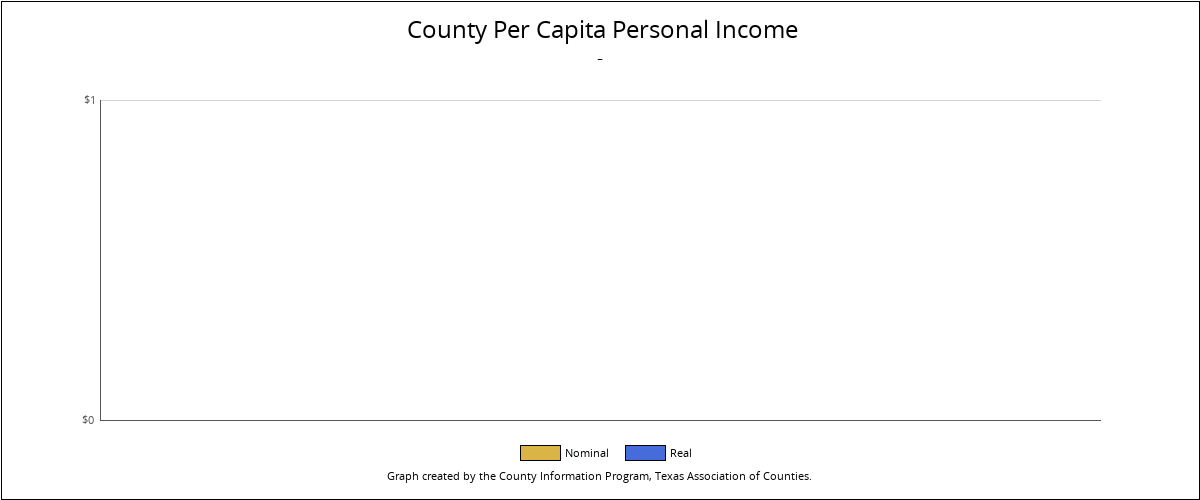Dawson County Per Capita Income
Compiled by
The County Information Program, Texas Association of Counties
The information contained in this report was obtained from the U.S. Bureau of Economic Analysis,
CAINC1 County and MSA Personal Income Summary: Personal Income, Population, Per Capita Personal Income interactive data table.
The estimates provided by the U.S. Bureau of Economic Analysis. However, the changes since the prior year are from calculations by the County Information Program, Texas Association of Counties.
For more information, contact the CIP at (512) 478-8753.

- According to the U.S. Bureau of Economic Analysis, Personal Income
[c]onsists of the income that persons receive in return for their provision of labor, land, and capital used in current production as well as other income, such as personal current transfer receipts. In the state and local personal income accounts the personal income of an area represents the income received by or on behalf of the persons residing in that area. It is calculated as the sum of wages and salaries, supplements to wages and salaries, proprietors' income with inventory valuation (IVA) and capital consumption adjustments (CCAdj), rental income of persons with capital consumption adjustment (CCAdj), personal dividend income, personal interest income, and personal current transfer receipts, less contributions for government social insurance plus the adjustment for residence.
- According to the U.S. Bureau of Economic Analysis, Per Capita Personal Income is the
personal income of a given area divided by the resident population of the area.
- Lack of a visible bar can occur when the amount is so small the result is a bar less than one pixel in height.
- Nominal amounts are not adjusted for inflation.
- Real amounts are adjusted for inflation.
| Data for the Dawson County Per Capita Personal Income Chart |
|---|
| Year | Per Capita Personal Income (Nominal) | Change (Nominal) | Per Capita Personal Income (Real) | Change (Real) |
|---|
| 2001 | $18,475 | N/A | $18,475 | N/A |
| 2002 | $19,905 | 7.7% | $19,595 | 6.1% |
| 2003 | $22,182 | 11.4% | $21,350 | 9.0% |
| 2004 | $23,083 | 4.1% | $21,641 | 1.4% |
| 2005 | $25,436 | 10.2% | $23,066 | 6.6% |
| 2006 | $23,157 | -9.0% | $20,343 | -11.8% |
| 2007 | $28,132 | 21.5% | $24,029 | 18.1% |
| 2008 | $24,671 | -12.3% | $20,293 | -15.5% |
| 2009 | $25,408 | 3.0% | $20,974 | 3.4% |
| 2010 | $32,537 | 28.1% | $26,426 | 26.0% |
| 2011 | $30,120 | -7.4% | $23,714 | -10.3% |
| 2012 | $31,140 | 3.4% | $24,020 | 1.3% |
| 2013 | $40,765 | 30.9% | $30,991 | 29.0% |
| 2014 | $35,749 | -12.3% | $26,743 | -13.7% |
| 2015 | $33,223 | -7.1% | $24,824 | -7.2% |
| 2016 | $33,141 | -0.2% | $24,455 | -1.5% |
| 2017 | $37,267 | 12.4% | $26,926 | 10.1% |
| 2018 | $42,346 | 13.6% | $29,866 | 10.9% |
| 2019 | $40,546 | -4.3% | $28,087 | -6.0% |
| 2020 | $43,439 | 7.1% | $29,725 | 5.8% |
| 2021 | $45,683 | 5.2% | $29,857 | 0.4% |
| 2022 | $56,349 | 23.3% | $34,100 | 14.2% |
| 2023 | $54,953 | -2.5% | $31,940 | -6.3% |